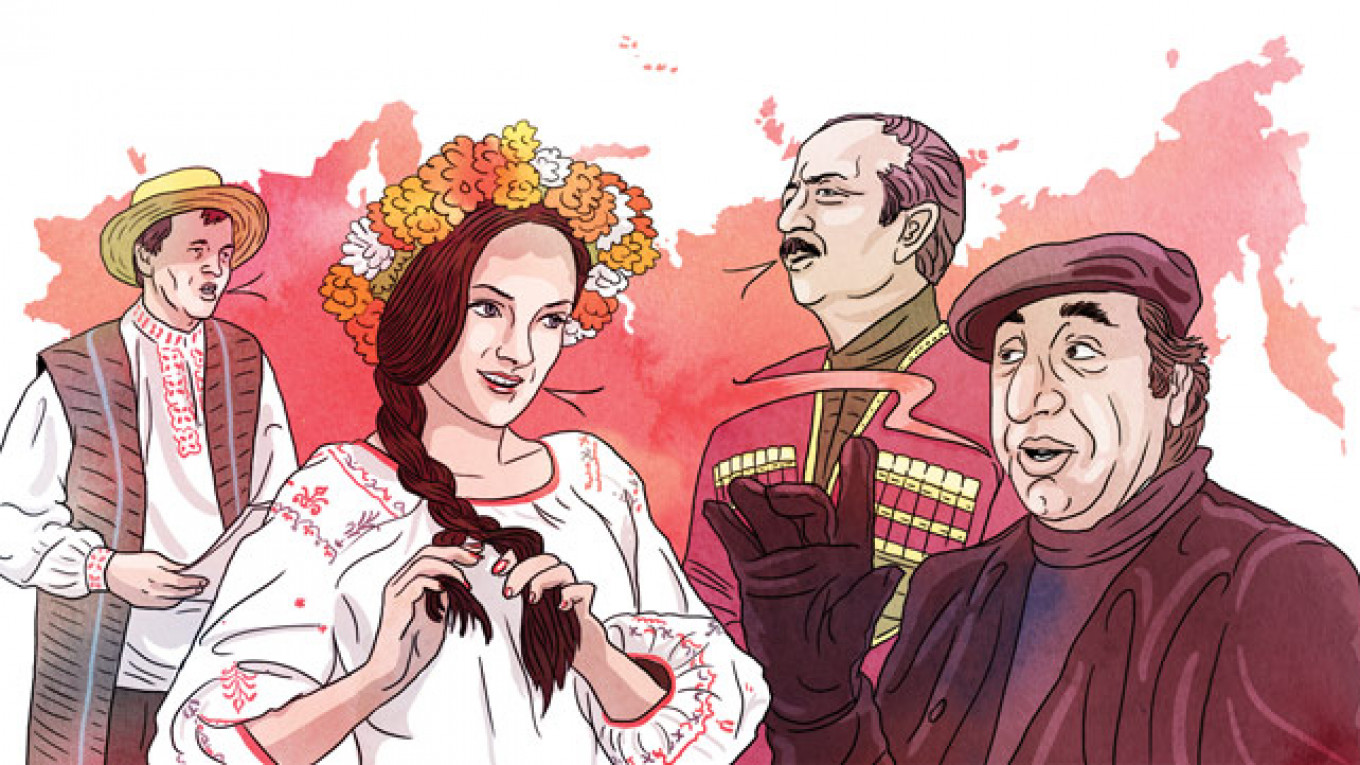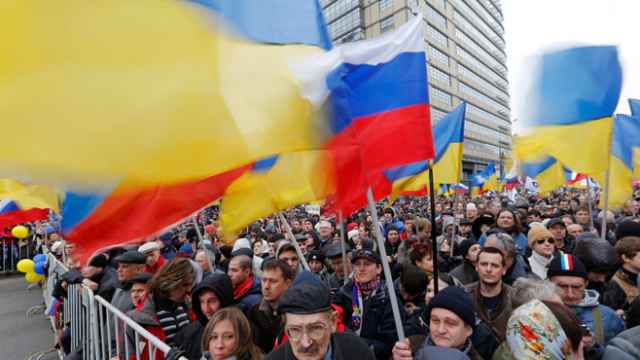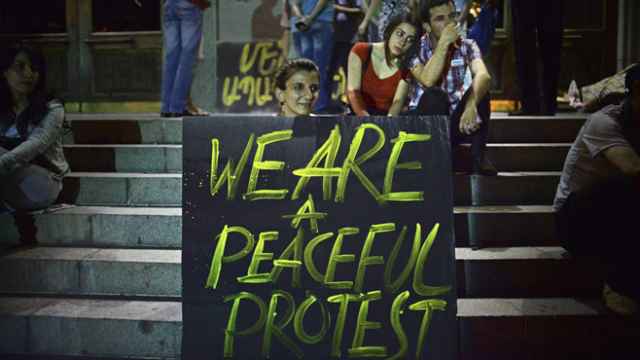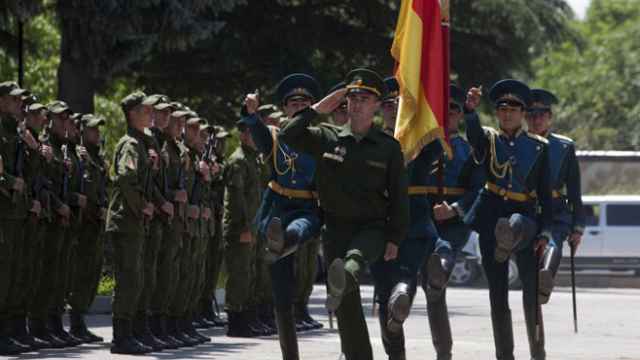As the president of Georgia, Mikheil Saakashvili rarely missed a chance to present himself as a man whose mission was to dismantle every vestige of Soviet or Russian imperial legacy. He opened a museum of occupation in Tbilisi and ordered a gigantic World War II memorial be blown up to make way for a new Georgian parliament building. He made English rather than Russian the primary foreign language in Georgian schools and later called on Ukrainians to follow suit.
Yet, reincarnated as governor of Ukraine's Odessa region and consequently stripped of Georgian citizenship, he is living proof that a common ex-Soviet, Russian-speaking, Eurasian — you name it — cultural and political space remains very much alive and kicking. This may sound like good news to the Kremlin, but it's anything but. Should he succeed in the half-Russian-speaking Ukraine, Saakashvili would create an alternative leadership model that might prove attractive to many in Russia proper.
When compared with the model nation state, Poland — a country of 96 percent ethnic Poles and 91 percent Roman Catholics — the former Soviet states appear somewhat messy. Many citizens juggle identities and countries of residence without much of a second thought. Russia's political establishment, for example, includes many born in Ukraine — Federation Council Chairwoman Valentina Matviyenko, Culture Minister Vladimir Medinsky, Energy Minister Alexander Novak, liberal politician Grigory Yavlinsky and ultraconservative State Duma Deputy Irina Yarovaya.
For its part, Ukraine has had an ethnic Buryat prime minister hailing from Siberia, a defense minister who held Russian citizenship and Russia-born politicians too numerous to list.
One of the most striking examples of a complex ex-Soviet identity is last year's Nobel laureate in literature Svetlana Alexievich — a Russian-language author of Ukrainian extraction who holds Belarussian citizenship and is critical of the Russian regime.
It only gets messier when a former president of one country embarks on a fresh career in another one. And Saakashvili didn't arrive in Ukraine alone, but with a number of his former Georgian colleagues, some of whom filled positions within the Odessa administration, while others occupy key posts in Kiev and lead reforms of the Ukrainian police, prosecutor's office and health care system.
It doesn't all come down to Georgians. Saakashvili made a risky move inviting Russian opposition politician Maria Gaidar to reform the welfare system in Odessa. Although Ukrainians regard Russia as the aggressor waging war against their country, former Russian journalist Vladimir Fedorin runs a think tank that develops reform packages for team Saakashvili. Also within the Odessa governor's orbit is fugitive Russian businessman Yevgeny Chichvarkin.
This internationalist approach has gone down well with the Ukrainian public, definitely much better than that of the ultra-nationalists who failed miserably in the two post-Maidan elections. Saakashvili emerged as Ukraine's most popular politician — well ahead of President Petro Poroshenko and Prime Minister Arseniy Yatsenyuk — in an International Republican Institute (IRI) poll published in September 2015.
Toward the end of the year, the Odessa governor felt confident enough to directly challenge the unpopular Yatsenyuk, accusing his government of corruption and stalling crucial reforms. Many in Ukraine began eyeing the Odessa governor as the country's next prime minister.
The confrontation culminated in a half-ugly, half-comic spat between Saakashvili and Interior Minister Arsen Avakov during a session of the National Reform Council on Dec. 14. The two men exchanged abuse in Russian urban slang, rather than the official Ukrainian language, before Avakov tossed a glass of water in Saakashvili's face and told him "to get out of my country."
Known for his inability to master the Ukrainian language, Avakov is an ethnic Armenian from the overwhelmingly Russian-speaking Kharkiv, Ukraine's second-largest city. Therefore, the scene evoked the classic Soviet comedy "Mimino," a film of a Georgian and an Armenian who engage in multiple petty arguments before becoming best friends.
Despite his conflict with the former Georgian president, Avakov continues to work closely with his deputy in charge of police reform, Eka Zguladze, who conducted comparable reform in Georgia under Saakashvili. Avakov is also patron of the Azov regiment, a military unit formed by Ukrainian ultra-nationalists with strong crypto-fascist tendencies.
In another Ukrainian paradox, this military unit contains more Russian- than Ukrainian-speakers and includes a fair number of ultra-nationalists and neo-Nazis from Russia proper, keen to fight against Putin's regime. A year ago, Poroshenko awarded Ukrainian citizenship to Azov fighter Sergei Korotkikh, a Belarussian who belonged to Russian National Unity, which strove to restore the Russian Empire.
In the Ukrainian media and social networks, the most toxic Russophobes also tend to write and speak in Russian. One of the best examples is Serhiy Ivanov, a blogging former prosecutor who once suggested that the Nazis should have killed Russians rather than Jews in the gas chambers.
To address the cognitive dissonance of being Russian-speaking and anti-Russian at the same time, pro-Maidan activists have jumped on the idea of political nation whereby citizens feel united no matter their linguistic or ethnic background. A seemingly progressive concept, in practice it mirrors Putin's nationalist ideology, with its "us against them" and "state above everything" paradigms, which allow the Kremlin to engage ethnic groups as different as Chechens and Buryats in its schemes, including the war in the Donbass.
By intervening in Ukraine, Putin has made it easy for many in Ukraine to think in terms of "us against the Russians." The latter seen as inherently imperialist barbarians whose actions stem from their Asiatic mentality and — as many in Ukraine will happily point out — genetics. The Kremlin is aided by rampant Russophobia that alienates millions for whom "Russia or Ukraine" is a false dilemma because they culturally identify themselves with both.
But Saakashvili's attempt to conduct genuine reforms in Ukraine pits him against a dramatically different enemy — a state essentially privatized by the oligarchy, corrupt law-enforcers and organized crime. Often referred to as mafia state, it is the system predominant in both Russia and Ukraine. The latter appears even below Russia on the corruption perception index by Transparency International, even though Ukraine's democracy and civil society are much stronger than Russia's.
It is curious that when Saakashvili tries to strike at the heart of the system, he encounters resistance from politicians who come across as staunch patriots and indeed nationalists. The reason being that despite the Maidan revolution, much of Ukrainian politics remains controlled by oligarchs who invest in parties of all shades and colors, not least in the nationalists.
The Russian, Ukrainian and other former Soviet oligarchies are so intertwined, it is almost a single entity. Embezzled and laundered money ignores borders and national loyalties. Nationalism is not a way of undoing the mafia state because it is the mafia state's favorite political tool, both in Ukraine and Russia. But as Saakashvili demonstrates, joint efforts by people from different former Soviet Union nations, including Russia, might be the answer.
A Message from The Moscow Times:
Dear readers,
We are facing unprecedented challenges. Russia's Prosecutor General's Office has designated The Moscow Times as an "undesirable" organization, criminalizing our work and putting our staff at risk of prosecution. This follows our earlier unjust labeling as a "foreign agent."
These actions are direct attempts to silence independent journalism in Russia. The authorities claim our work "discredits the decisions of the Russian leadership." We see things differently: we strive to provide accurate, unbiased reporting on Russia.
We, the journalists of The Moscow Times, refuse to be silenced. But to continue our work, we need your help.
Your support, no matter how small, makes a world of difference. If you can, please support us monthly starting from just $2. It's quick to set up, and every contribution makes a significant impact.
By supporting The Moscow Times, you're defending open, independent journalism in the face of repression. Thank you for standing with us.
Remind me later.








